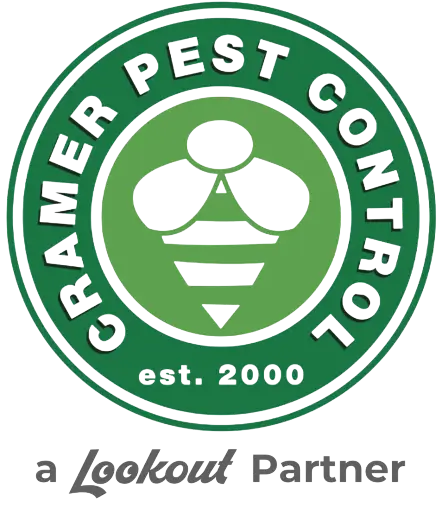Don’t Risk a Snake Bite – Call a Professional
Steve Irwin always made it look easy – but don’t be fooled! Snake wrangling is a skill like everything else and the costs of getting wrong are just too high. Our animal control service specialists are trained to safely take care of your snake problem!
Cramer Pest Control is now a Lookout Partner! Lookout handles a wide range of wildlife removal, exclusion, and prevention options, including snake removal. Visit Lookout to learn more.
Even Indiana Jones Doesn’t Like Snakes – That’s Why We Offer Snake Removal Services
Snakes are primordially scary – a part of our brain just doesn’t like things that crawl without legs! And this is for good reason, as venomous snakes can pose a serious risk if not treated with respect. We provide snake relocation so you don’t have to live with these scaly critters!
Our Snake Control Process
Site Assessment
Our first step is always to undertake a thorough site investigation. If the snake is visible we’ll do a snake identification and determine the safest way to remove it. Since snakes cannot make holes in your house, we determine their entry point and assess for rodent infestation.
Snake removal
Snakes are an important part of the local ecosystem and so we take every opportunity to remove them unharmed. Depending on your situation our pest control experts may deploy snake repellent to encourage the snake to relocate, use snake traps, or if the snake is visible we can use snake tongs to safely capture the snake.
Recommendations for Exclusion and PEst Control
Snakes are non-destructive and won’t have created a hole to enter your house. Instead they will have come in through an existing hole – possibly one created by rodents. To prevent snakes from returning, we will make recommendations for exclusion and assess for the possibility of a rodent infestation.
Reasons To Choose Cramer Pest Control – Fort Mill SC
Expert Service Comes From Expert Training
A core component of our business is training. Our technicians carry Clemson Extension Univ 7A certification, allowing us to identify and capture snakes. We run weekly training sessions for all of our staff, including safety training, pest control best practices, and on how to provide top-tier customer service.
We’re Only Finished When You’re Happy With the Results
At Cramer Pest Control we don’t consider our job done until your pest problem has been completely handled. After our technicians visit your home you’ll receive a follow-up call – if you have any remaining concerns let us know and we’ll take care of it!
A Commitment to Customer Service
Everybody says it, but so many pest control companies get it wrong. From your first phone call, to our technician’s visit, to follow-up calls you can expect an unrelenting commitment to your satisfaction. We don’t just want customers, we want raving fans.
See What People Have to Say About Our Pest Management Services

Frequently Asked Questions
Do snakes come back after removal?
Whether or not snakes return depends on whether or not the underlying factors that led them to your house are taken care of. Rodent infestations and easy access make your home an inviting space for snakes – a good exclusion job will prevent both rodents and snakes from entering your home.
Why would a snake come into my home?
Snakes are attracted to warmth, water sources, and good hunting grounds. If your yard has lots of tall grass or piles of dead leaves this encourages a large rodent population, which in turn attracts snakes. In the winter snakes may be looking for a warm place to go into brumation – a reptilian process similar to hibernation.
What types of snakes are common in the Carolinas?
The most common snakes homeowners are likely to encounter in North and South Carolina include:
Venomous Snakes:
- Copperheads
- Water moccasins AKA cottonmouth
- Diamondback rattlesnakes
- Coral snake – a very uncommon, but highly venomous coastal species of snake
Non-Venomous Snakes
- Garter snakes
- Eastern rat snake
- Kingsnake
How can I discourage a snake from coming into my home?
The best way for homeowners to prevent snakes from coming into their home is the exact same as for preventing rodent intrusion. Keep your yard tidy and be sure to close up any exterior crevices and holes which would provide easy access to your home.
What time of year do snakes normally get into homes?
Fall is the time when the most snakes are sighted indoors – both because the leaf litter on the ground makes for a rodent playground and because as the weather gets colder snakes begin looking for a place to spend the winter.
Location
Contact Us Today
Contact Page
Snake Removal in Fort Mill SC | Cramer Pest Control in North Carolina and South Carolina
Protecting North Carolina and South Carolina
